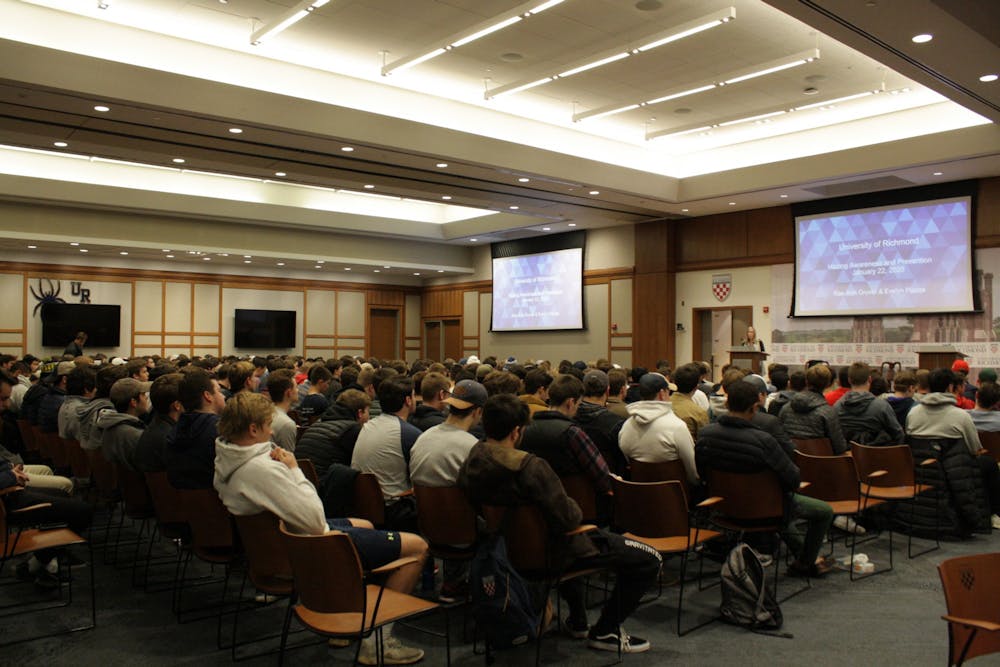Two mothers of students who died because of fraternity hazing spoke at a program in the Queally Center Breed Pavilion on Wednesday evening.
Rae Ann Gruver and Evelyn Piazza, the mothers of Max Gruver and Tim Piazza, shared the stories of their sons’ deaths and emphasized the dangers of hazing and the importance of reporting it.
The program’s two sessions were split by college affiliation, which Meg Pevarski, associate director of Greek Life, said was intended to avoid students thinking that the content applied only to one college. Westhampton College students attended from 6-7 p.m., and Richmond College students attended from 7:30-8:30 p.m.
Gruver and Piazza described their sons’ personalities and interests before talking about the nights their sons died. Max Gruver attended Louisiana State University and died in September 2017. Tim Piazza attended Pennsylvania State University and died in February 2017.
Gruver spoke steadily, although she stopped at points to collect herself, such as when she described a hazing ritual where pledges had to recite the Greek alphabet. If they made a mistake, they had to drink Diesel, a 190-proof alcohol.
“Every time they got to Max,” Gruver said, voice breaking, “he messed up. He couldn’t remember ‘upsilon.’ It was the only letter of the Greek alphabet he had to remember – ‘upsilon.’”
Piazza asked the audience to put themselves in her family’s shoes and told the story from the perspective of Tim Piazza’s brother.
“Close your eyes and imagine that your brother’s going to pledge a fraternity, and it started last night,” she began.
“You get a call from your brother’s roommate saying he didn’t come home last night, and that’s not like him,” she said. “You decide something’s wrong, and call the hospital to see if he’s there. They say yes, there’s been an accident.”
The detailed accounts deeply affected some audience members.
Kelsey Harry, a sophomore member of Greek life in the audience, said the stories had been devastating and that everyone should learn from them.
Some students left the room during the event. A warning about the talk’s content was not issued before the earlier 6 p.m. session, which Pevarski said had been an oversight.
Enjoy what you're reading?
Signup for our newsletter
“This can be a really personal topic for a lot of different people,” Pevarski said. “We should have offered a trigger warning in advance.”
At the end of the 6 p.m. session, Pevarski reminded the audience of campus support resources like Counseling and Psychological Services. She issued a trigger warning before the 7:30 p.m. session.
Gruver and Piazza both highlighted the importance of reporting incidents of hazing.
“Hazing is everyone in this room’s problem,” Gruver said. “Therefore, it’s everyone’s responsibility. ... [People] might not remember what organization it was that it happened to, but they’re going to remember that it happened on this campus.”
During the program, Gruver referred to the indefinite suspension of Sigma Chi fraternity’s chapter at the University of Richmond in March 2019, following a hazing investigation.
Pevarski said the suspension spurred UR to look for alternative ways to increase awareness about hazing. This search ultimately led to Wednesday’s program, which Pevarski first heard at a conference she attended in February 2019 with Panhellenic Council student leaders.
The talk counted as a Standards of Excellence educational program, which Greek life organizations are required to attend six of during the academic year. At least 75% of each chapter must attend the event for the organization to receive credit, according to the Center for Student Involvement website.
Although not required, Greek life organizations were heavily encouraged to use Wednesday’s event as an SOE program, Pevarski said, since “the topic isn’t just a what-if on our campus anymore.”
Students agreed that the talk was especially relevant to the campus community.
“Most of us do not realize how small hazing can start,” said Alexis Aviles, a senior and member of Greek life. “I think we make a lot of excuses... I hope this helped to realign people’s thinking.”
Aviles echoed concerns that Gruver brought up during the program.
“Hazing escalates into all kinds of things, and you don’t know where it’s going to go or what’s going to happen the next time,” Gruver said. “You could literally be playing Russian roulette with someone else’s life.”
Reed Burke, a junior in Greek life, also agreed that it was important to bring anti-hazing programs to smaller schools like UR, not just to big schools like Penn State.
Pevarski confirmed that an anonymous hazing reporting hotline is in the works at UR. Resources with policy and reporting information are also being sent to the families of new Greek life members, she said.
The program was intentionally scheduled shortly after Bid Day, Pevarski said.
“We wanted both members and new members to hear this message at the start of their six-week new-member process,” she said. “To hear that this is where we stand, this is something that the university believes in.”
Contact news contributor Caroline Fernandez at caroline.fernandez@richmond.edu.
Support independent student media
You can make a tax-deductible donation by clicking the button below, which takes you to our secure PayPal account. The page is set up to receive contributions in whatever amount you designate. We look forward to using the money we raise to further our mission of providing honest and accurate information to students, faculty, staff, alumni and others in the general public.
Donate Now



